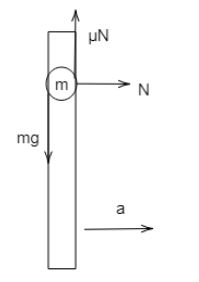Question
Question: A bead of mass \[m\] can slide on a thin vertical rod, with sliding friction coefficient \(\mu = 0.4...
A bead of mass m can slide on a thin vertical rod, with sliding friction coefficient μ=0.4. The rod is translated horizontally with a constant acceleration a. For what value of a will an observer on earth see equal horizontal and vertical components of the acceleration of the bead?
Solution
This question is based on the concept of sliding friction. So, in this question first we need to find the value of the horizontal and the vertical component of force and with the help of it, we need to find the horizontal and the vertical component of acceleration. Then we will equate the two components, as they are given equal in the question.
Complete step by step answer:
The diagram of this question is,

Given, the bead is sliding vertically down with friction which will oppose it.The following are the forces acting on the bead:
(A) The normal force N exerted on it by the rod in the horizontal direction.
(B) The force of sliding friction μN which acts vertically upward.
(C) Its weight mg in the vertically downward direction.
Net force in the vertical direction FV=Mg−μN.
Net force in the horizontal direction FH=Ma.
The normal force is N=ma, as the normal force is acting in the horizontal direction.Now, we need the value of a for which the observer on earth can see equal horizontal and vertical components of the acceleration of the bead. So, horizontal component of acceleration = vertical component of acceleration
MMg−μN=MMa
On putting N=ma,
MMg−μMa=MMa
⇒Mg−μMa=Ma
On cancelling M on both the sides,
g−μa=a
⇒a+μa=g
On taking a as common on LHS,
a(1+μ)=g
⇒a=1+μg
We know that g=9.8s2m and μ=0.4(given),
a=1+0.49.8
⇒a=1.49.8
∴a=7ms2
Hence, the value of a for which an observer on earth can see equal horizontal and vertical components of the acceleration of the bead is a=7ms2.
Note: Normal force is contact force. Normal force is also known as a normal reaction force. This force acts only when an object is in contact with another object. But if there is no contact between two objects then the normal force does not act. The SI unit of normal force is Newton.
